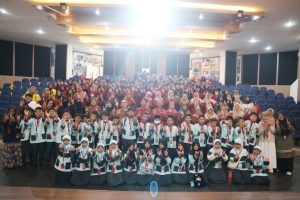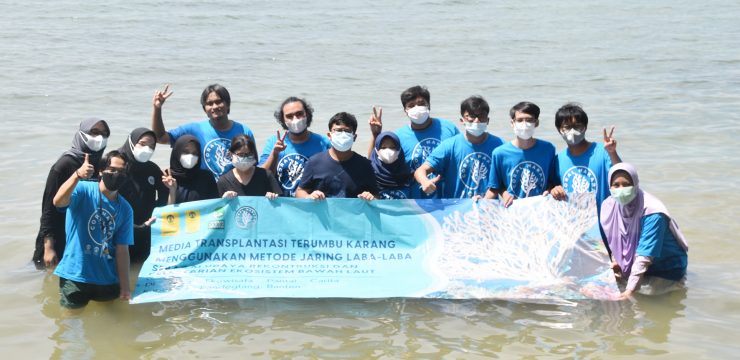|

The Department of Biology
Faculty of Mathematics and Natural Sciences Universitas Indonesia

Indonesia is the largest archipelagic country in the world, as two-thirds of its territory consists of ocean. Within it lies immense marine wealth, including the biodiversity of marine life—one of which is coral reefs.
Coral reefs are unique tropical marine ecosystems that are vital as a source of life for marine organisms, due to their high productivity and biodiversity.
However, coral reefs are currently under constant heavy pressure due to various human activities, both on land and at sea.
As a result, coral reef damage continues to increase. Many coral reefs in Indonesia are either damaged or in poor condition. This includes the coral reef area at Ketapang Beach, Sukarame, Banten, where many corals were found to be deteriorating and in need of rehabilitation.
This is what prompted the community service team from FMIPA UI, led by Dr. Retno Lestari, M.Sc., to carry out coral reef rehabilitation at Ketapang Beach, Sukarame, Banten, on October 30, 2021.
This activity is a community service program (Pengmas) supported by funding from the Directorate of Community Engagement and Empowerment of Universitas Indonesia (DPPM UI), in collaboration with the Pandu Cendekia Foundation and the Underwater Nature Conservation Group in Sukarame Village.
Through this program, Dr. Retno and her team aim to prevent the degradation of coral reefs, thereby ensuring the preservation of coral reefs in their natural habitat.
“This activity aims to serve as an educational platform to encourage community and stakeholder participation in preserving and managing marine ecosystems. The rehabilitation effort focuses on coral reef restoration to enhance biodiversity and the marine beauty of Ketapang Beach,” said Dr. Retno to the FMIPA UI Public Relations team.
“It is hoped that this conservation effort can be managed sustainably by the relevant parties,” added Dr. Retno.
The reason behind choosing Ketapang Beach as the activity location, according to her, is because the site is one of the coral stock centers or Coral Stock Center which is managed with the aim of rehabilitating coastal areas, ornamental corals, and other nature conservation activities.
Dr. Retno and her team were directly involved in the coral transplantation or grafting process. The procedure began with the creation of substrates (transplantation media) made from a mixture of soil and cement. The substrates were then molded using wooden blocks and left to dry.
Coral fragments were then planted onto the media and placed on special racks made of iron. The team, together with the Underwater Nature Conservation Group, then transported the media to be transplanted onto the seabed.
The head of the Underwater Nature Conservation Group at Ketapang Beach, Arip, welcomed this program. He and his fellow marine conservation activists hope that this activity can accelerate the regeneration of damaged coral reefs and help build new coral reef areas where none previously existed at the beach. This, in turn, is expected to enhance the beauty of the underwater environment and boost the local economy through the tourism sector.
"We observed that the coral reefs were starting to turn black and die, which led to the intention of rehabilitating them. This activity not only helps preserve the marine habitat but also boosts the local economy by showcasing the beauty of Ketapang Beach, thereby attracting tourists," said Arip.
"Thank you, FMIPA UI. This has had a positive impact. Hopefully, it doesn’t stop here and can continue sustainably," he added.
News source : https://sci.ui.ac.id/
